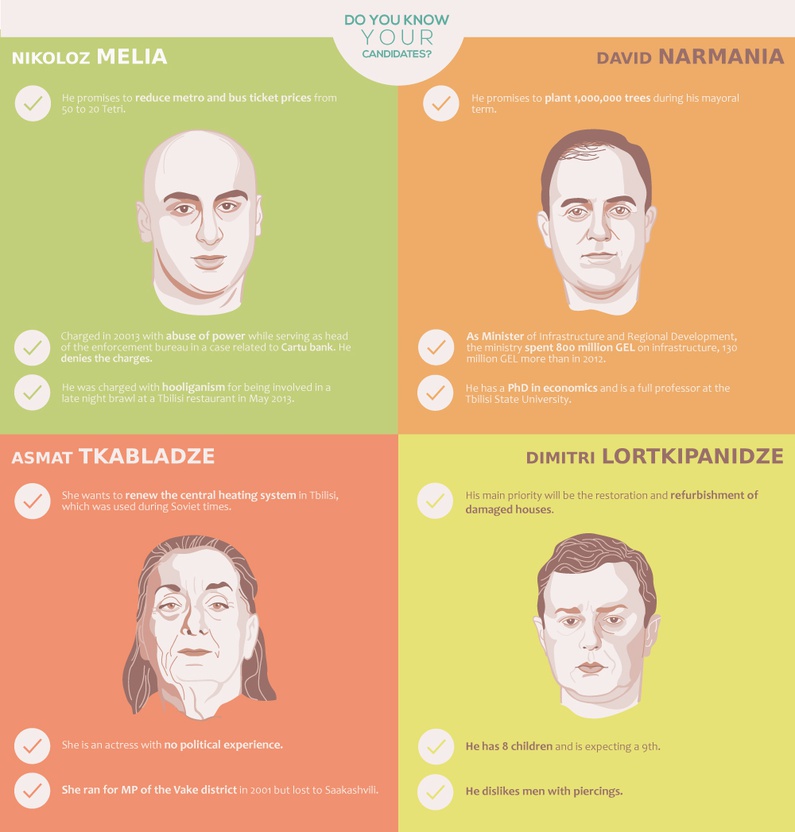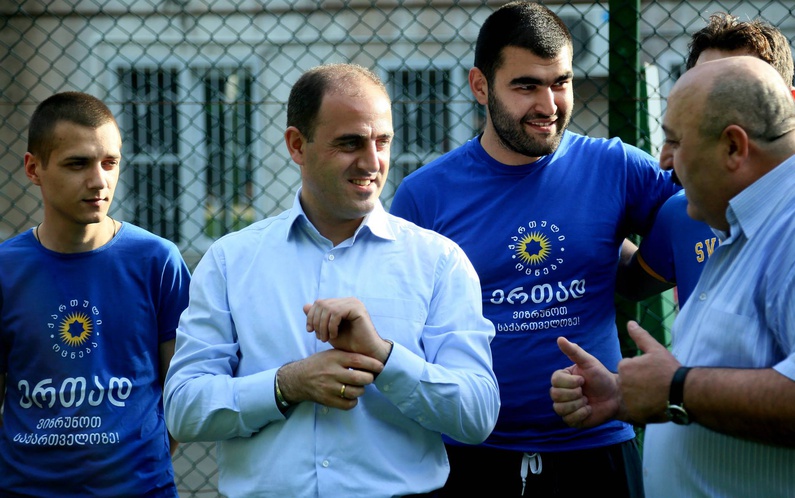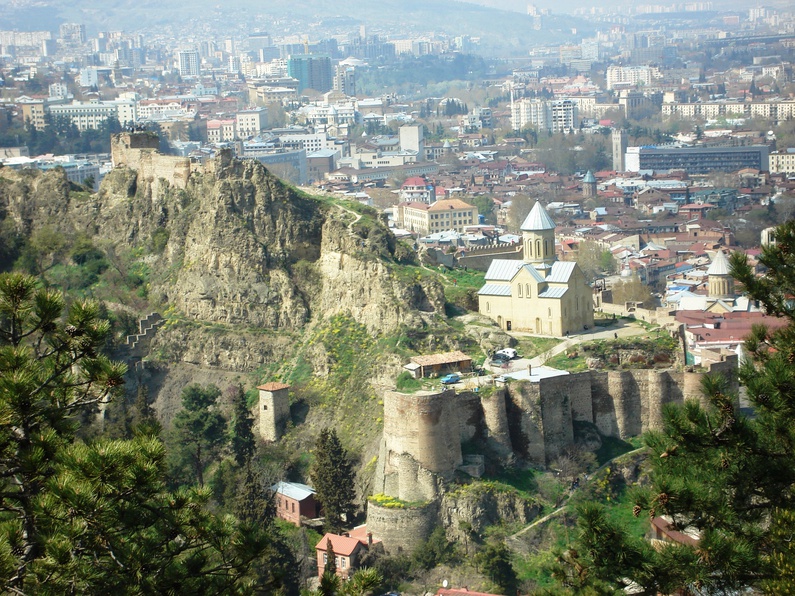
Tbilisi's Mayoral Candidates Missing Their Marbles
Published on
On 15 June, Georgia holds local elections. But these are no normal elections. For the first time, 12 city mayors and 59 heads of the local municipalities, known as Gamgebelis, will be directly elected. Previously, only the mayor of Tbilisi was directly elected. But what is on offer for the people of Georgia? The candidates are less underwhelming, more overwhelmingly whacky and weird
Regardless of the air of novelty conjured up by changes to the electoral code, the Georgian Dream’s candidate for Tbilisi mayor, Davit Narmania, has been pegged as the sure fire victor of this year’s mayoral race, leaving little room for mystery or surprise. But despite the potentially predictable outcome, the diverse and slightly bizarre group of candidates running for Tbilisi mayor may provide a sprinkling of spectacle to an otherwise unremarkable race.
Narmania himself is perhaps the least eccentric of the bunch. Serving as the country’s minister of regional development since the October 2012 Parliamentary elections propelled the Georgian Dream back onto the political playing field; Narmania has been called “one of the best ministers in the new government”. He holds a PhD in economics and is a full professor at the Tbilisi State University. But while Narmania has been praised for spending 800 million GEL (332 million Euros) on infrastructure and development in 2013, his plans for Tbilisi’s future have been lambasted for bordering on the utopian. He recently declared that he will plant one million trees in the capital during his mayoral term, a feat critics have deemed spatially impossible.
In keeping with the United National Movement’s (UNM) propensity to protect politicians under investigation, Nicoloz Melia, the UNM’s candidate for Tbilisi’s mayor, is perhaps best known for his court cases. In September 2013, he was charged with abuse of power while serving as head of Georgia’s National Enforcement Bureau, a position he held prior to the 2012 parliamentary elections. The case in question is related to Cartu Bank, an entity that belongs to former Prime Minister and leader of the Georgian Dream, billionaire Bidzina Ivanishvili.
After Ivanishvili declared his intention to go into politics in 2011, the bank promptly ran into difficulties that officials claim were caused by a UNM plot to bankrupt the bank. While Melia denies his involvement in the scheme, he is implicated by evidence presented to the court during the investigation. Having been released from detention on $15,000 bail, the UNM politician has continued in his role as governor of the Tbilisi district Mtsminda. But if Melia appears unfazed by his court case, it may be because he is no stranger to the criminal justice system. In May 2013 he was also charged with hooliganism after a physical confrontation unfolded between several UNM leaders at the Tbilisi based restaurant La Trufe.
Shimmying out of the traditional UNM/Georgian Dream dichotomy is the independent candidate Dimitri Lortkipanadze. Led by Nino Burjanadze -- the former speaker of parliament and Margaret Thatcher look-alike who was a semi-serious contender in the 2013 Presidential elections -- a coalition of several non-parliamentary opposition parties, known as the United Position, named Lortkipanadze their candidate for Tbilisi city mayor. Lortkipanadze’s previous political career can hardly be qualified as a glowing success. An inconsequential member of parliament from 2008-2012, he made an unsuccessful bid for the public defender’s post in 2009 and failed to secure the position of ombudsman in late 2012. In fact, almost all of his support comes from the families of prisoners, whose rights the United Position candidate has vehemently defended. But while his defense of those behind bars is commendable, Lortkipanadze’s humanism is undermined by his vitriol towards other marginalized groups. The candidate is best known throughout the capital for a homophobic hate speech that was viewed thousands of time on You Tube.
But while Lortkipanadze’s career leaves something to be desired, his candidacy is preferable to that of Asmat Tkabladze’s for the sole reason that he has a political past to speak of. The Labour party’s candidate is well known around town, but not for her voting record. A quick Google search will lead you to the actress’s IMDb page, fully equipped with a list of her most popular films. Perhaps upon choosing a candidate the Labour party determined it would be more desirable to select someone whose most popular piece isn’t mired in intolerance.
 And these are just some of the most well-known candidates. This June 15, Tbilisi will be teaming with hopeful office-seekers, most of whom don’t stand a chance against the brawler and homophobe who could give the Georgian Dream’s poster boy a run for his money. Some of these candidates include Teimuraz Murvanidze, a set designer nominated by ex-foreign minister Salome Zourabichvili’s party Georgia’s Way; Mikheil Saluashvili, a candidate nominated by the party “In the Name of the Lord- the Lord is Our Truth”, which received 0.08% of votes in the 2013 presidential election; and Ina Inashvili, the owner of the media outlet Obieqtivi, best known for its affiliation with one of the men featured in a leaked sex video that led to the detention of ex-Deputy Interior Minister Gela Khvedelidze.
And these are just some of the most well-known candidates. This June 15, Tbilisi will be teaming with hopeful office-seekers, most of whom don’t stand a chance against the brawler and homophobe who could give the Georgian Dream’s poster boy a run for his money. Some of these candidates include Teimuraz Murvanidze, a set designer nominated by ex-foreign minister Salome Zourabichvili’s party Georgia’s Way; Mikheil Saluashvili, a candidate nominated by the party “In the Name of the Lord- the Lord is Our Truth”, which received 0.08% of votes in the 2013 presidential election; and Ina Inashvili, the owner of the media outlet Obieqtivi, best known for its affiliation with one of the men featured in a leaked sex video that led to the detention of ex-Deputy Interior Minister Gela Khvedelidze.
With this auspicious assemble of contenders, can anyone really wonder why Narmania would win by a landslide?



